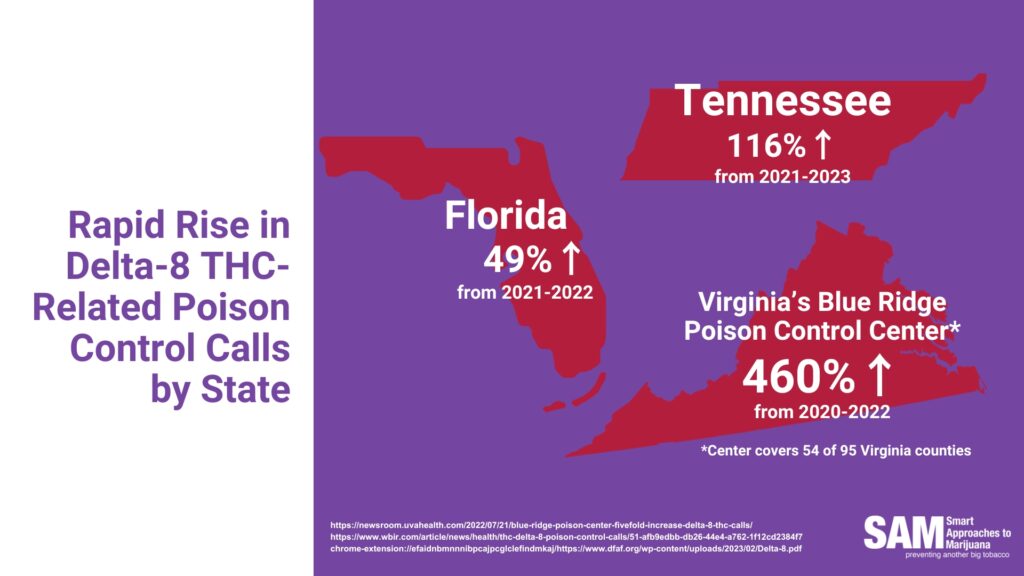
What is Delta-8 THC and How Did it Get Legalized:
Delta-8 THC is a cannabinoid found in the hemp plant and is structurally similar to Delta-9 THC, the psychoactive component of marijuana that makes people feel “high.” Delta-8 THC was inadvertently legalized in 2018 when that year’s Farm Bill legalized hemp. Hemp is required to have a Delta-9 THC content lower than 0.3%, but unlimited amounts of Delta-8 THC can be synthesized from the plant. However, Delta-8 THC can be converted into much stronger concentrations. There is no federal regulatory framework for––or ban on––Delta-8 THC.
As a result, thousands of unregulated Delta-8 THC products are now being sold across the country. Many of these products are packed to look like candies and snacks, which increase the risk of kids accidentally consuming them.
Report Highlights:
Information provided by the FDA indicates that poison control centers received 2,362 exposure cases of Delta-8 THC products between January 1, 2021, and February 28, 2022. Of these, 41% involved pediatric patients under the age of 18. Unintentional exposures accounted for 40% of cases, with pediatric patients comprising 82% of these incidents. Seventy percent of the exposure cases required evaluation at healthcare facilities, and 8% of those were critical enough to necessitate admission to intensive care units. Alarmingly, one pediatric case resulted in death.
The image above displays a significant increase in poison control calls due to Delta-8 THC exposure across several states within a year.
- The Blue Ridge Poison Center at UVA Health, one of three poison control centers in Virginia, saw calls to the poison center rise from 20 calls in 2020 to 112 calls in 2022, marking a 460% increase.
- In Florida, poison centers experienced a 49% increase in calls, from 168 in 2021 to 250 in 2022.
- Tennessee reported approximately 115 calls from 2021 to 2022, with 32 affecting children under 6, and in the following year, calls doubled to 248 in 2022 to 2023, with 110 involving young children.
Policy Recommendation: Ban Intoxicating Hemp-Derivatives
We recommend a two-tiered approach to addressing the issue of hemp-derived Delta-8 THC:
1. Federal Action:
- Close the existing legal loophole for hemp-derived THC in the 2018 Farm Bill.
- Implement a federal ban on Delta-8 THC to maintain consistency nationwide.
2. State Action:
- Follow Arkansas’s model legislation, featuring a clear definition of intoxicating products, banning their sale and possession, and enforcing regulatory compliance effectively.
- 17 states––including pro-marijuana states like Colorado, Oregon, and Washington––have already banned Delta-8 THC.
Take Action
Congress can close the Delta-8 loophole this year by clarifying the hemp legalization provisions to ban the manufacturing and sale of psychoactive hemp-derived compounds.
Please urge your Representatives and Senators to support closing this loophole by participating in our campaign through Voter Voice.